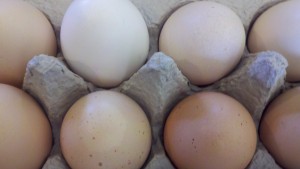Thanks to Michigan’s Farmers for the Bounty
 Every year on this day, I thank the great Michigan producers—and for some years, I’ve been cooking Thanksgiving using only Michigan producers, with just a few ingredient exceptions–who bring us our meal.
Every year on this day, I thank the great Michigan producers—and for some years, I’ve been cooking Thanksgiving using only Michigan producers, with just a few ingredient exceptions–who bring us our meal.
Our food was brought to use by many of the same farmers and artisans as last year, though I made my pie crust with whole wheat pasty flour from the Jennings Brothers, and we’ll be drinking Bells and Bowers Harbor this year instead of Founders and Brys Estate.
But I want to focus on the eggs that will go into our pumpkin pie.
You see, it’s been a really tough year for eggs in MI. Many chickens died in the heat wave in June. Then, with the drought, pastured chickens had to work harder to eat and weren’t producing much as a result. And naturally raised chickens are going to be laying almost no eggs this time a year: Mother Nature gives her chickens more time off than Wal-Mart gives its workers?
Mind you, I’ve still been able to get eggs. But eggs—along with stone fruit, particularly tart cherries and peaches, which were devastated by our spring heat wave followed by frost—eggs are one of the things that made an urban girl like me realize how devastating the weather was.
If I had to work hard to remember to ask for eggs ahead of time, think how hard the farmers were working to keep their chickens healthy?
So it was mighty humbling the other day when our farmer handed me eggs. Humbling, because I didn’t think there’d be eggs for purchase in any case. Particularly humbling because she just gave them to me. “Here, don’t tell anyone.” (So I’m telling all of you, just “protecting my sources”!)
Something as prosaic as eggs, become a precious gift due to the rhythm of nature but also the very unnatural thing weather has become.
The food we share on this holiday is always precious, whether it comes from a local farmer or a big supermarket. It’s the sharing, after all, that makes it precious. We’re probably going to need a lot more of that sharing in the years to come.
Thanks to all of you for sharing with us here–may that gracious sharing continue through the next year!

The very best to you and yours, Marcy.
Sharing could well become the way of life, if we are very lucky, and come to find and celebrate our common humanity.
DW
Marcy — You are such a good Michigan citizen! Very nice post. Thank you for all the digging you do into the things that we all need to know.
Happy Thanksgiving to you and the Mr. and your pup and all your family. It’s like a nice spring day here in Ann Arbor. The leaves are mostly gone, but the grass is still green.
@FFein: Here too. The new place has a south-facing deck. So the pup has been sunning himself on the deck while I putter in the kitchen. I think it’s safe to say he approves so far.
Well, I would like to get in on all this awesome turkey making talk. So, I made a video of the process. You will thank me!
Happy Turkey Day to ew and everyone. Glad the new digs are woking out.
Thought the terrific photo of the Cranes Dancing Farm in “The secret to turkey: bacon,”
http://www.emptywheel.net/2012/11/21/the-secret-to-turkey-bacon/
illustrated the possible potential for integrating pasture fed poultry (no roosters) into urban agriculture.
In urban areas the single biggest impediment might be the odor/stench from those large coops.
You can see birds seeking shade underneath them. When those killer heatwaves come, there would have to be more shade.
The wooden pallets underneath the watering containers facilitate moving them to the next paddock.
The white flexible fencing is right out of Joel Salatin’s “disturbance and rest.” http://www.manyfoldfarm.com/blog/2009/08/disturbance-and-rest-a-weekend-with-joel-salatinor-death-for-breakfast-sex-for-supper/
In urban areas is it enough to keep skunks, raccoons, badgers, coyotes out? Some stock losses are unavoidable.
The pasture reduces feed costs for the poultry. Once they are done scratching and fertilizing, the ground “rests,” until the next planting…….
Keeping the poultry alive and fed in winter is another important challenge/expense for urban farmers to consider. Do the coops provide an enhanced level of portability to poultry farming? If urban farmers could lease their “pasture” to organic/humane poultry operations, when the weather is good, might it be a win-win for both?
OT, interesting piece arguing that pasture fed beef, (integrating disturbance and rest) INCREASES carbon sequestration.
http://www.treehugger.com/green-food/in-defense-of-the-cow-how-eating-meat-could-help-slow-climate-change.html
Thanksgiving again. How nice, yet so new to celebrate as you move your home. That gives a different spin on the occasion.
I well understand the nature of buying local. We didn’t have the horrible weather you experienced in the Midwest. And, with the growth of the Spirits industry (even hard liquor), we have no excuse not to buy local their either. But this can change in a heartbeat.
So, with that, I wish to you all, a wonderful, satisfying holiday. And I’ll probably get caught up in the civil war action at Reser Stadium. Both teams have something at stake.
Meanwhile here’s a sweet story centered on Oregon football:
http://www.gazettetimes.com/sports/college/civil-war-football-murphy-takes-field-as-part-of-teamcole/article_3757a620-3465-11e2-abc2-0019bb2963f4.html
Beautiful post, Marcy.
Happy Thanksgiving to all.
And here’s to more sharing.